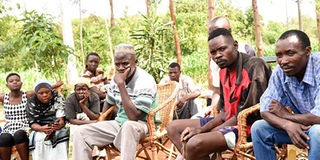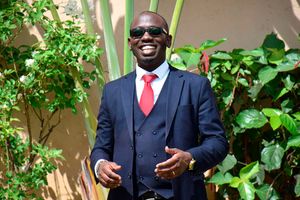Premium
Origins and spread of 14 and 42 brothers gangs

Family members and friends gather at the home of Petronilla Mung'oi, who was murdered alongside her daughter on May 4, 2019 in Matungu, Kakamega County. The attacks are suspected to have been carried out by 14 Brothers, a gang. PHOTO | ISAAC WALE | NATION MEDIA GROUP
What you need to know:
- Cells of the dreaded gang spread to Khwisero, Mumias West, Mumias East — with residents of Emabole, Sabatia, Mwichinga, Shirumba, Bululwe and Eshinyamwinyuli villages suffering attacks.
- According to local chiefs, 14 Brothers is an illegal grouping that was formed by jobless young people to put food on the table through crime.
- Security sources say the fight over sponsors’ money and influence and the subsequent division gave rise to a more ruthless gang called 14 Brothers.
Police and security sources say two bloodthirsty gangs — the 14 Brothers and the 42 Brothers — are carrying out the slaughter.
The 42 Brothers, whose roots are said to be in Kisumu, first shot to regional and national infamy at the end of 2018 when they launched suspected ritual killings in Butere, Mumias and Mulwanda in Khwisero, Kakamega County.
The bloodthirsty gang, whose members are said to be aged between 15 and 25 years, left at least 15 people dead in more than three sub-counties and more than 40 fighting for their lives in hospital.
The gangsters, believed to be heavy bhang smokers and rapists who strike with impunity — at one time killing a woman barely 100 metres from Butere Police Station — are usually heavily armed with machetes, axes, spiked clubs and knives.
In March, the murderers slaughtered at least six watchmen at Kilingili market on the border of Emuhaya and Sabatia constituencies.
MATUNGU
The bodies of victims of the murderous group that strikes indiscriminately bear signature calling cards: ripped tongues, gouged out eyes and genitals, deep head cuts and slit throats.
From Butere, cells of the dreaded gang spread to Khwisero, Mumias West, Mumias East — with residents of Emabole, Sabatia, Mwichinga, Shirumba, Bululwe and Eshinyamwinyuli villages suffering attacks — before finding a ‘home’ in Soweto and Kholera in Matungu.
Just as in Butere, members of the 42 Brothers gang in Matungu have been pursuing one main agenda: slaughtering villagers without fear or favour.
“These are the ‘Sonko’ (rich) criminals who are sponsored by politicians and business people and are not after victims’ money,” said a Nyumba Kumi chairman who sought anonymity, fearing for his life.
“Their mission is to kill people in their houses, on the road and anywhere else they get a chance. Once they finish you off, they leave.”
MILITIA
Two prominent traders in Butere and at least two senior politicians in Kakamega County are on the police radar for sponsoring the youthful merchants of death, who villagers say hardly work but are better off than the average villager.
Sources told the Nation that the benefactors of the gang use it to “finish” their imaginary, perceived and real business and political rivals.
“One of the businessmen sells Empire Waragi (a blacklisted killer spirit from Uganda), and the last time he was arrested in Kakamega he insisted that he be taken to Butere Police Station,” said Bishop Rashid Makokha of Christian Prayer Warriors Ministry.
“After a few calls, police granted his request and 30 minutes after arriving at the Butere station he was a free man. He celebrated by gifting boda-boda riders a whole pick-up of Waragi right outside the station.”
But investigations by the Nation revealed that the financial fortunes of 42 Brothers took a southern turn after finding a home in Matungu, leading to a split.
UNEMPLOYMENT
Security sources say the fight over sponsors’ money and influence and the subsequent division gave rise to a more ruthless gang called 14 Brothers.
“They (the 42 Brothers) recruited heavily but money was not flowing in as it used to. On forming the new group, their leaders, who are well-known to the police, set out for two things: Death and money,” said a local detective investigating the murders.
According to local chiefs, 14 Brothers is an illegal grouping that was formed by jobless young people to put food on the table through crime.
“14 Brothers engage in all manner of crimes for financial gain. They started off by stealing spare parts from Bookers (Mumias Sugar Company) and selling them in Butali,” said Bishop Makokha.
“They also ventured into illegal fuel siphoning and sale. Later, they started attacking villagers and demanding money.”
RECRUITS
The religious leader said the group, linked to a top official at Mumias Sugar who is suspected to be one of the beneficiaries of spare parts theft at the troubled miller, has now recruited female members who help the gangsters lure targets into its traps.
“In some cases, the women are used to get targets out of their houses and once they open the door, the gangsters attack. This is why they hardly break doors,” he said.
Internal battles for the control of the groups and deals gone sour have sometimes left gang members and leaders dead, local administrators told the Nation.
“We have cases where one of the leaders of 14 Brothers was killed by his partners in crime after he refused to share with them the money they had been given to do some job. He wanted the money shared after work but his friends thought it was a ploy to take it all and went for him,” said a local chief on condition of anonymity.






